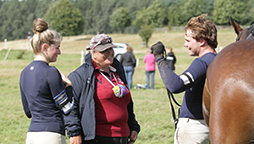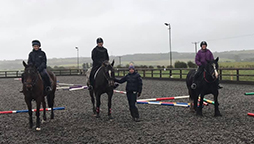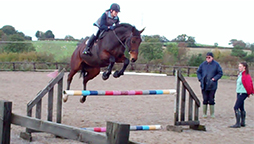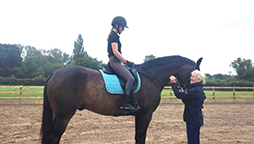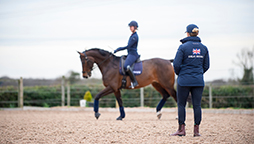Coaching children
While some coaches will specialise in working with one particular participant group, others will work across several different groups over the course of their coaching. The coaches featured on this page are just some of those who work with riders up to the age of 12, from learningto ride through to training and competing.
Quick Jump to a coach's profile
Imran Atcha
Lynne Blore
Alison Short
Lisa Stevenson
Imran Atcha 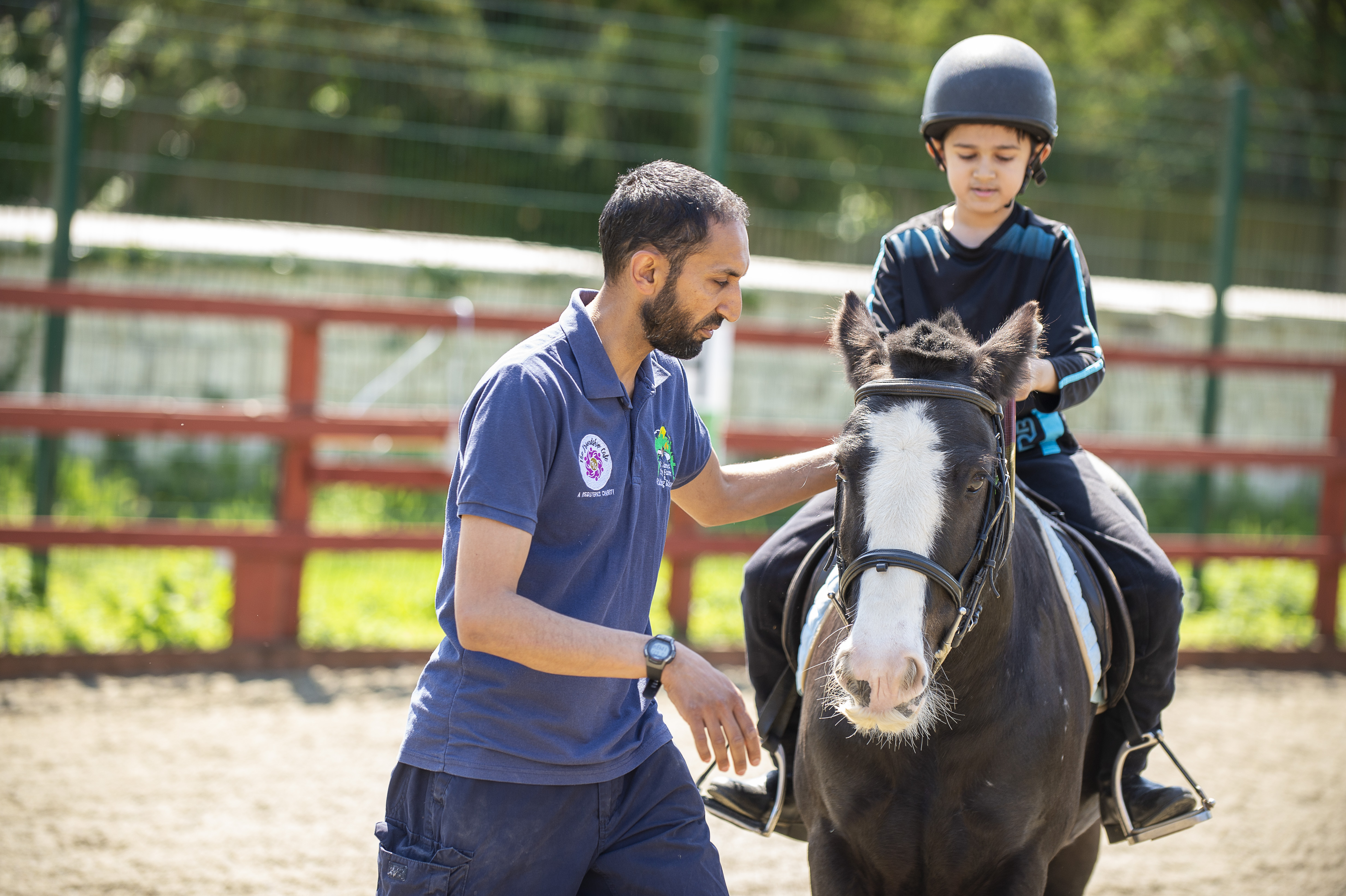
What are your coaching qualifications?
BHS Stage 1 and 2, BHS Stage 2 Teach
WHAT's THE MAIN PARTICIPANT GROUP THAT YOU COACH?
Riders up to the age of 12 of all abilities.
DO YOU HAVE A COACHING SPECIALTY or favourite aspect of coaching?
I find coaching small children particularly rewarding. Most have never sat on a horse, or even seen one, and the first time they ever sit on a pony is very special – they all react differently, but generally their faces light up and they have a big, beaming smile afterwards. The pony may only be 11 hands, high but in their eyes it’s a huge horse.
What inspired you to start coaching?
I'm determined to making riding accessible to anyone who wants to learn, regardless of background. It was a long journey for me to get to ride and I wanted to make it easier for others, so a handful of us got together and started our riding project in the most socially deprived part of our city.
What’s your proudest coaching moment?
I have many proud moments, from just watching the children make progress, to parents or teachers telling me that their child has never smiled or talked so much before. I've also been able to see one of my students, who I taught from lead rein, becoming a better rider than me!
How would you encapsulate your approach to coaching?
Keeping it very simple, with no jargon or no special clothes. Fun is first priority, and treating your horse with kindness. One of the key goals of our project is to make riding affordable so that anybody who wants to can learn – our one-to-one lessons are no more than £5, while lead rein is £2.50 – made possible by our generous supporters.
DO YOU HAVE A PIECE OF WISDOM THAT YOU FEEL MOST RIDERS COULD BENEFIT FROM?
In my experience, a large part of riding is your mental state – feeling confident, relaxed and happy – and the other half is physical – your fitness, position and balance in the saddle. I am always learning something new from far more experienced people, which I then translate in simple terms to riders.
What advice do you have for somebody looking for a coach to learn from?
You need to find someone who will challenge you to push yourself so that you improve, but also makes it fun and varied. A rider should learn the basics, then try different areas or disciplines to find out what they like best. It doesn’t have to be competitive or specialist, either – some people are happy just wandering around the countryside on a horse, and there's nothing wrong with that.
Lynne Blore 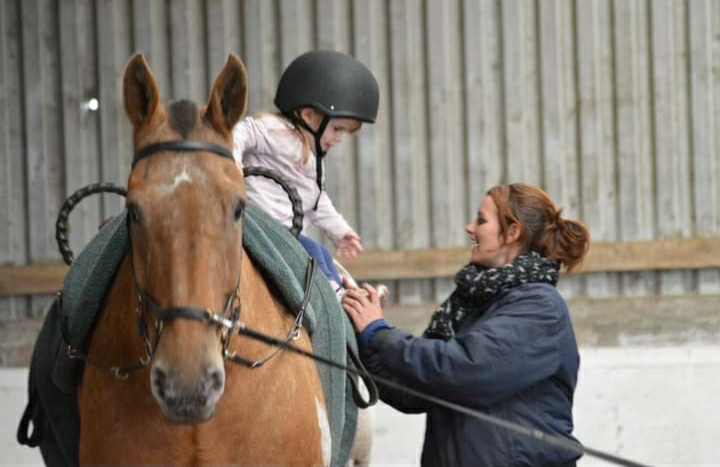
What are your coaching qualifications?
BHS Accredited Professional Coach, UKCC Level 2, British Equestrian Vaulting Level 1, SVQ 3
WHAT ARE THE MAIN PARTICIPANT GROUPS THAT YOU COACH?
- Riders up to the age of 12 of all abilities
- Teenagers of all abilities
- Adult participations riders
DO YOU HAVE A COACHING SPECIALTY or favourite aspect of coaching?
I work with adults and children with a range of disabilities, and I most love teaching vaulting. I enjoy the teamwork with others and the connection with the horses, and seeing my vaulters develop in balance, confidence, coordination, strength and overcoming physical and mental challenges.
What inspired you to start coaching?
I started volunteering with Riding for the Disabled Association (RDA) when I was 14, and gradually grew in confidence enough to start teaching classes. I just want others to enjoy horses as much as I do and to help them develop and achieve their goals.
What’s your proudest coaching moment?
I felt so proud watching those I coach all come together as a team at competitions and displays, seeing their focus, confidence and performance come out.
How would you encapsulate your approach to coaching?
I am person- and horse-led, and can be flexible and adaptable to what the horse or rider needs in order to thrive.
Have you had to adapt your coaching over the past six months? Do you think it's made you a better coach?
I had to get creative, organising weekly challenges, quizzes and Zoom catch-ups. Once we could return to vaulting sessions, I had to train the parents to assist the vaulters to enable us to keep socially distanced. I was pleasantly surprised by how confident they all were when they returned – it has made me have to think harder about how I can keep them safe, but challenged.
DO YOU HAVE A PIECE OF WISDOM THAT YOU FEEL MOST RIDERS COULD BENEFIT FROM?
Nobody ever stops learning with horses – you can learn something from every horse and build yourself a toolkit of skills to grow your overall riding and horsemanship.
What advice do you have for somebody looking for a coach to learn from?
Find someone who compliments your learning style and shares your philosophy with horse training and management, someone who appreciates your horse and what they can offer, and someone who is knowledgeable, understanding and supportive of your goals.
Alison Short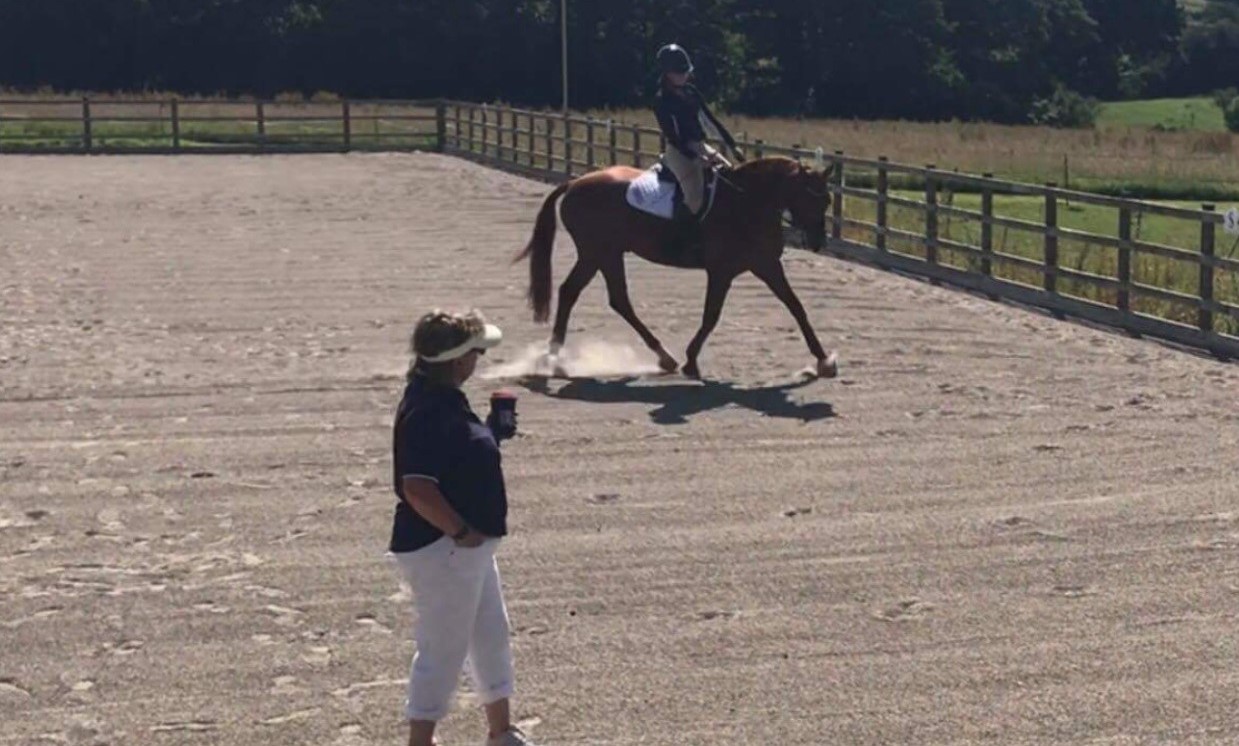
What are your coaching qualifications?
UKCC Level 3
WHAT ARE THE MAIN PARTICIPANT GROUPS THAT YOU COACH?
- Riders up to the age of 12 of all abilities
- Performance development riders
DO YOU HAVE A COACHING SPECIALTY or favourite aspect of coaching?
Polework.
What inspired you to start coaching?
As a child, I found it difficult to participate in group sports because I lacked performance confidence. One day, PE coach selected me to help the relay team develop a strategy for school sports day, and from then on I was motivated to help others reach their peak performance through strategy development. Mixing that with the love of horses was my dream career.
What’s your proudest coaching moment?
Bringing dressage to young riders, and seeing their expressions while they're developing correct aiding, is to be a feeling like no other. One example that stands out was helping a young partnership progress from tension and miscommunication to gaining third place at the Winter Championships at Medium Level – it was a magical moment for all three of us!
How would you encapsulate your approach to coaching?
Bringing inclusion to our sport is one of my main objectives, in addition to keeping the purity that can often gets lost when we humans become over-competitive. Horses are such incredible readers of our behaviour, so coaching riders to make their own, educated decisions is my biggest aim.
Have you had to adapt your coaching over the past six months? Do you think it's made you a better coach?
This very strange time of COVID-19 has been an opportunity for true reflection. One thing that has shone through is the clarity it's brought to the values of learning for so many. By sharing my online training discussions to a wide audience on social media, I've developed a weekly training group. We've built a network of riders from all levels who can interact without fear of judgement, which in turn brings transparency and enables people to learn from each other. Through live messaging, riders are asking more questions because they feel more confident behind a screen. It's really opened my mind to how I relay information and the need to check it's fully understood – as well as sometimes challenged my IT skills!
DO YOU HAVE A PIECE OF WISDOM THAT YOU FEEL MOST RIDERS COULD BENEFIT FROM?
Visualisation is often an under-utilised form of learning, and reliving “feel” can be done off your horse as well as in the saddle. Equally, the mindset in which you visualise is always a work in progress. Decluttering your mind before riding is vitally important, too.
What advice do you have for somebody looking for a coach to learn from?
Firstly, a coach is someone who always has your horse's welfare in the forefront of their practice. Training is a three-way activity – there's the coach, you and your horse – and finding the balance between kindness, discipline, knowledge and honesty is of vital importance to all parties. Attending a clinic on foot, if this is permitted, can be a valuable chance to see a coach in action, but one lesson doesn't always give you a full insight to their knowledge or coaching style. Try to watch several riders who are of the same level as you – this can really help you feel more relaxed about training, helping you feel more confident and less pressured to be of a certain standard to be able to take part. Coaching is about not just sharing knowledge, but about exploring what the rider knows – some riders find questioning undermining, but feedback creates great rapport and helps the coach identify what learning is taking place.
lISA sTEVENSON
What are your coaching qualifications?
UKCC Level 1 Youth Coach
WHAT's THE MAIN PARTICIPANT GROUPS THAT YOU COACH?
Riders up to the age of 12 of all abilities.
What inspired you to start coaching?
A love of horses and a desire to learn more, then pass that knowledge on to others.
What’s your proudest coaching moment?
Personally, gaining my UKCC Level 1 was a proud moment for me. There's also helping a disabled girl learn how to hold the reins correctly and steer the horse, and seeing the joy this brought to her.
How would you encapsulate your approach to coaching?
I can understand people having a lack of confidence, having been through this myself, so I like to gain their trust, discover their fears and gradually help them overcome them.
Do you have a piece of coaching wisdom that you feel most riders could benefit from?
Take your time to correctly install the basics, then the rest will fall into place.
What advice do you have for somebody looking for a coach to learn from?
I'd suggest looking for someone qualified and insured, and they should have a depth of knowledge and experience. In addition, they should be someone that you feel comfortable with and believe in.
